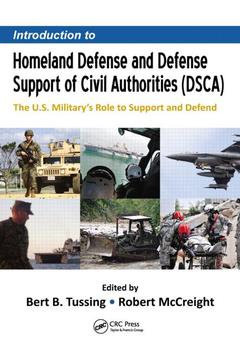Introduction to Homeland Defense and Defense Support of Civil Authorities (DSCA) The U.S. Military's Role to Support and Defend
Coordonnateurs : Tussing Bert B., McCreight Robert

The application of our Armed Forces within the states and territories of the United States is far from intuitive. The challenges of defending the country against assaults within the homeland are much more complex than engaging our enemies on foreign soil. Likewise, the introduction of the military?s appreciable capabilities in response to disasters, be they natural or manmade, comes with authorities and restrictions reflective of an American ethos that will always hold those forces as the servants of the people, never their overseers. Introduction to Homeland Defense and Defense Support of Civil Authorities (DSCA): The U.S. Military?s Role to Support and Defend examines the requirements and regulations that guide the utilization of our forces in the domestic environment.
Topics include:
- The importance of the distinctions between homeland security, homeland defense, and Defense Support of Civil Authorities as they pertain to both authorities and responsibilities
- The deliberately subservient position of the military to civil authorities when engaged in response and recovery operations following a disaster
- The unique relationship between the United States Navy and the United States Coast Guard in a mutually supportive effort that bridges requirements between defense on the high seas and law enforcement in territorial waters
- The air defense mission over the United States, orchestrating manned aircraft, unmanned aircraft, and cruise missiles against threats of the same nature
- The exceptional challenges that would be associated with the application of land forces in a defense mission on American soil
- The development of the CBRN (Chemical, Biological, Radiological, Nuclear) Enterprise as a function of the nation?s focus on preventing, responding to and recovering from a Weapons of Mass Destruction attack
- New challenges emerging in the domestic environment that will call for the application of military resources, to include the Arctic, complex catastrophes, and cybersecurity issues
Homeland Defense and Homeland Security: Distinctions and Difference. Homeland Defense and Defense Support of Civil Authorities: Philosophy and Ethos, Reality and Constraints. Civil–Military Partnership: Homeland Defense Enterprise. Homeland Security and Homeland Defense in the Maritime Domain. Likelihood versus Consequence: The Application of the Land Component in Homeland Defense. Homeland Security and WMD Protection Issues. Homeland Defense— Emerging Challenges.
Professor Bert B. Tussingis Director of Homeland Defense and Security Issues at the U.S. Army War College, where he has served since retiring from the Marine Corps in 2000. He holds master's degrees in Strategic Studies from the Army War College, and National Security and Strategic Studies from the U.S. Naval War College. He has served on special advisory groups for both the Department of Defense and the Department of Homeland Security. In 2014 he was awarded an Honorary Doctorate of Humane Letters by Northwestern State University for his work in homeland security, homeland defense, and defense support of civil authorities.
Robert McCreight, PhD,served the United States government at the State Department and in other federal agencies over the span of a 35-year career, before retiring in 2004 and serving as a consultant for major homeland security and national defense contractors. His professional career includes work as an intelligence analyst, treaty negotiator, arms control delegate to the United Nations, counterterrorism advisor, political–military affairs analyst, and Deputy Director of Global Scientific Exchanges at the State Department. He completed his doctoral degree in public administration in 1989 and remains active in graduate education programs in emergency and crisis management as well as in security studies and terrorism analysis.
Date de parution : 01-2015
17.8x25.4 cm
Thèmes d’Introduction to Homeland Defense and Defense Support of... :
Mots-clés :
Homeland Defense; Defense Support; Understanding Dsca; Federal Reserve; Intelligence And Information Sharing In Dsca; Homeland Security; The Ground Component--Border Security And Beyond-Arnorth; CBRN Response; JTF CS; Dsca; National Guard Bureau; Key Principles Of Defense Support To Civil Authorities; CBRN Incident; Understanding Hemispheric Homeland Defense; CBRN Attack; Defense Support Of Civil Authorities; Maritime Domain; U.S; Military; NORAD; Homeland Security Enterprise; Federal Aviation Administration; FAA; Critical Defense Infrastructure; Air Defense Mission; James Jay Carafano; Arctic Council; JFO; Aerospace Domain; Coast Guard; Air Domain; NSSEs; Maritime Security; National Security Strategy



